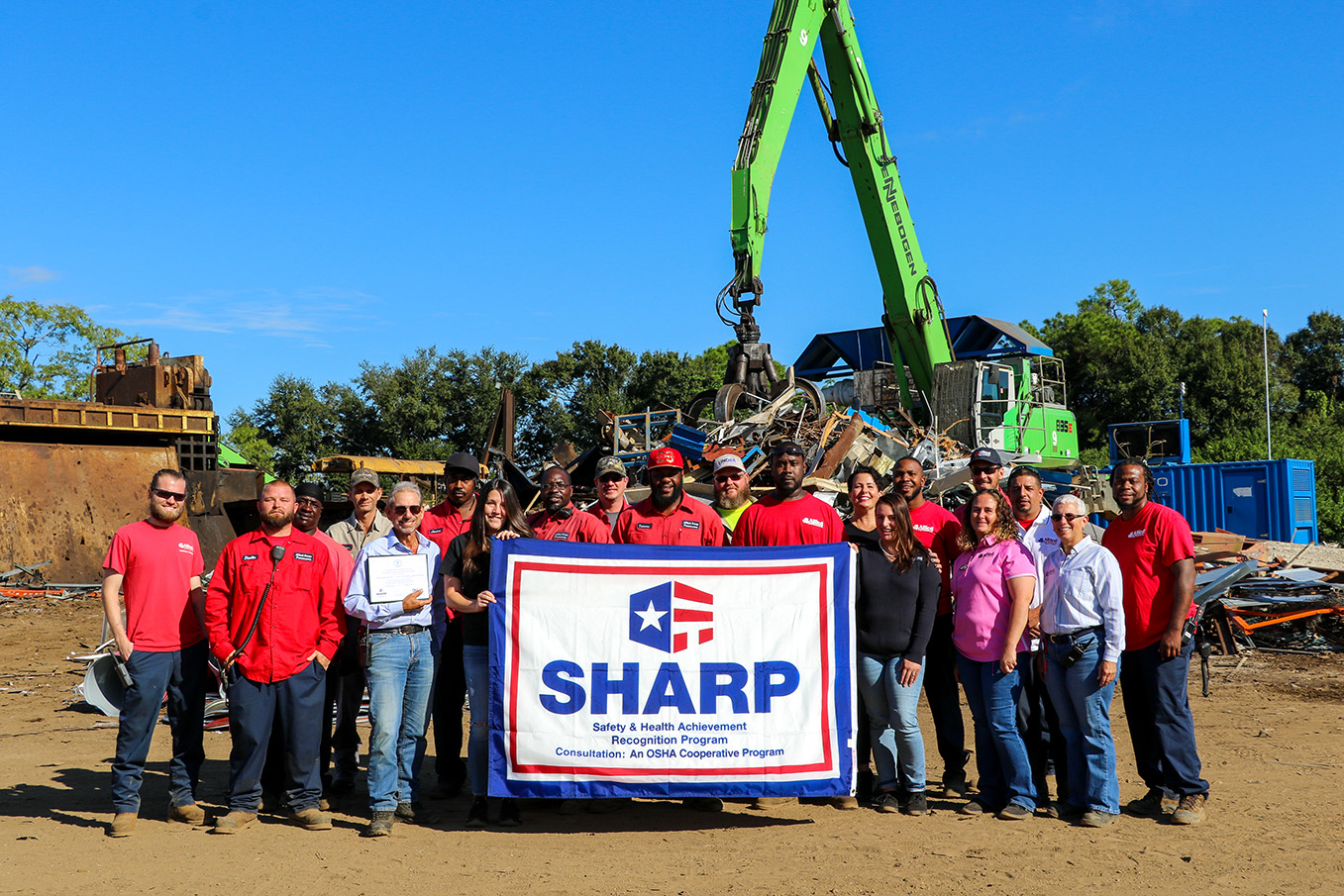Metals recycler Allied Scrap Processors has achieved its second Safety & Health Achievement Recognition Program (SHARP) Certificate of Safety from the Occupational Safety and Health Administration. The program recognizes small business employers who have used OSHA’s On-Site Consultation Program services and operate exemplary safety and health programs.
Operating in Lakeland, Fla. since 1956, Frank Giglia Jr. and Rose Mock, the company’s second-generation owners, believe safety is everyone’s responsibility and top priority. “Our team works diligently every second of the day to be safe, and to be aware of the safety and security of all team members and customers around them,” Giglia says. Allied Scrap Processors received its first SHARP Certificate in 2015.
The company has strict safety programs in place including mandatory monthly safety meetings for staff and updating its safety manual to accommodate new machines or regulations. Allied Scrap Processors also ensures that every employee operating a machine is certified by the person who trained the employee and the maintenance manager. “The trainer and maintenance manager come together and give the employee a verbal and written exam, and if the employee passes, then they get certified,” Giglia says. “Both components are important, but the verbal exam gets at what the employee really thinks about safety rather than going through a checklist.”
To build a culture of safety that goes beyond a checklist, the company empowers its employees to speak out about safety. “If an employee thinks something is unsafe, they get on the radio and let everyone know,” Giglia explains. “We never want employees to ask someone first. If they see anything that may be a problem, then we want them to let us know so we can fix it.”
Allied Scrap Processors gives a monthly Attention to Safety award to recognize employees who adhere to safety procedures. “It can be something as simple as one employee nominating another employee for reminding them to wear a hardhat in a certain area of the facility,” Giglia says.
Each area of the company’s facility is self-contained with its own safety program and procedures. “We have various areas in our facility including a shear, a shredder pile, a nonferrous pile, and a stainless area. Each one has its own safety program, its own [personal protective equipment], and everyone in each area works as a team,” Giglia says. “They all know safety is important and they look out for each other, and that starts before they leave safety training.”
The company conducts its training so employees can easily absorb information without becoming overwhelmed. During the first few days of work, employees receive an introduction that includes a facility tour and watch their first set of safety videos. Each stage of training includes a specific set of videos, some of which come from ISRI’s website. The employees also learn about specific safety equipment in the areas they’ll be working in.
After the first 30 days, workers are given the safety section of the company’s manual and after 60 days, with a better sense of the facility, they review emergency procedures, right-to-know, and the stormwater pollution prevention plan.
“We do our training in stages,” Giglia explains. “We give new employees the information in easier-to-consume pieces. It’s like for the first 60 days they’re in a classroom learning more about safety. But even after the training there are also updates each month during our safety meetings.”
Cultivating a safety awareness mindset throughout the company is important to develop a culture of safety. “The little things like housekeeping, following procedures, and location awareness are all key in helping to create and maintain a safe workplace,” Giglia says.
Like many in the recycling industry, Allied Scrap Processors ensures that safety begins at the top with managerial diligence and trickles down the chain of command. “It involves everyone down the line from the president to the foremen to the leadmen,” Giglia says. “If all the people down the line are diligent, then every employee, even the newest 18-year-old employee on the team, is going to be diligent too.”
Giglia doesn’t anticipate future changes to the company’s safety program other than ensuring it keeps up with new machinery and equipment. “You have to move with the changes,” Giglia advises. “Equipment changes so the PM [preventative maintenance] changes, as do the safety procedures and inspections. You never know what’s going to be a new machine. If I gave you a PM for a machine 20 years ago and a PM for a machine now, even if it does the same job, it may be unrecognizable.”
Giglia credits much of his company’s achievement to following ISRI’s safety guidelines. “Our company’s success comes from following the ISRI guidelines that were developed by ISRI’s Safety Committee and recognized by [the Environmental Protection Agency] and OSHA,” he says. “I think it’s important to know that achieving SHARP isn’t something only our company can do—anyone in the recycling industry can do it.”
Photo courtesy of Allied Scrap Processors.
Additional Resources













